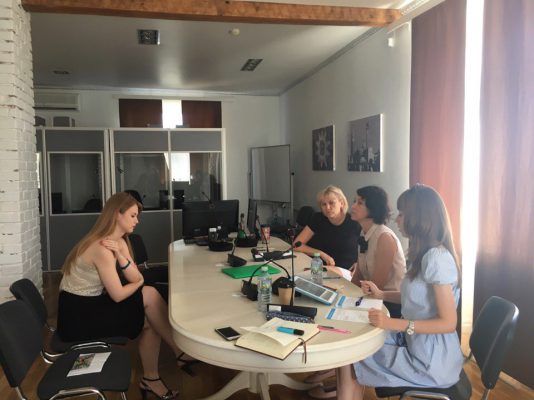Academic Year Started in the Caspian Higher School of Interpreting and Translation
 Classes are going to start shortly in the Caspian Higher School of Interpreting and Translation. While our MA students promoted to the second year of the program were practicing actively translation and interpretation and volunteering at various international events, the School academic staff were not wasting time, they were preparing for the entrance exam, which took place on the 1-2 August. The exam consisted of several stages and each of them required candidates’ maximum concentration. The first step to enter the School was to check candidates’ aptitude for consecutive interpreting. They were required to render correctly the speeches delivered by the members of the examining board in the target language; however, the candidates were not allowed to take any notes. Retentive memory and good command of the Russian and English languages helped the future master students to cope with this task successfully. Extensive knowledge covering everything that is happening in the world is the thing that differs the profession of interpreters and translators from any other vocation. It makes the testing of candidates’ background knowledge one of the most important stages of the exam. The School trainers asked questions on peculiarities of political situation in Latin America and Africa as well as on political system of the Russian Federation, there were even questions on the Seven Wonders of the World and the preserved one among them. Then the candidates were asked to make a translation of short passages from English into Russian and vice versa. The texts were related to different spheres: religion, international policy, economy, international organizations. The last stage required an answer to a question on the theory of translation to check candidates’ theoretical knowledge. The candidates were mainly successful in carrying out those difficult tasks. 11 candidates were given an opportunity to enroll in the MA programs titled “The Theory of Interpreting and Intercultural/Interlingual Communication” and “The Theory and Practice of Translation in Professional Communication”. We wish them success and steady development in their most interesting studies!
Classes are going to start shortly in the Caspian Higher School of Interpreting and Translation. While our MA students promoted to the second year of the program were practicing actively translation and interpretation and volunteering at various international events, the School academic staff were not wasting time, they were preparing for the entrance exam, which took place on the 1-2 August. The exam consisted of several stages and each of them required candidates’ maximum concentration. The first step to enter the School was to check candidates’ aptitude for consecutive interpreting. They were required to render correctly the speeches delivered by the members of the examining board in the target language; however, the candidates were not allowed to take any notes. Retentive memory and good command of the Russian and English languages helped the future master students to cope with this task successfully. Extensive knowledge covering everything that is happening in the world is the thing that differs the profession of interpreters and translators from any other vocation. It makes the testing of candidates’ background knowledge one of the most important stages of the exam. The School trainers asked questions on peculiarities of political situation in Latin America and Africa as well as on political system of the Russian Federation, there were even questions on the Seven Wonders of the World and the preserved one among them. Then the candidates were asked to make a translation of short passages from English into Russian and vice versa. The texts were related to different spheres: religion, international policy, economy, international organizations. The last stage required an answer to a question on the theory of translation to check candidates’ theoretical knowledge. The candidates were mainly successful in carrying out those difficult tasks. 11 candidates were given an opportunity to enroll in the MA programs titled “The Theory of Interpreting and Intercultural/Interlingual Communication” and “The Theory and Practice of Translation in Professional Communication”. We wish them success and steady development in their most interesting studies!





